‘Mariupol Moses’: A Man Who Took 117 People Out Of The Besieged City On Foot
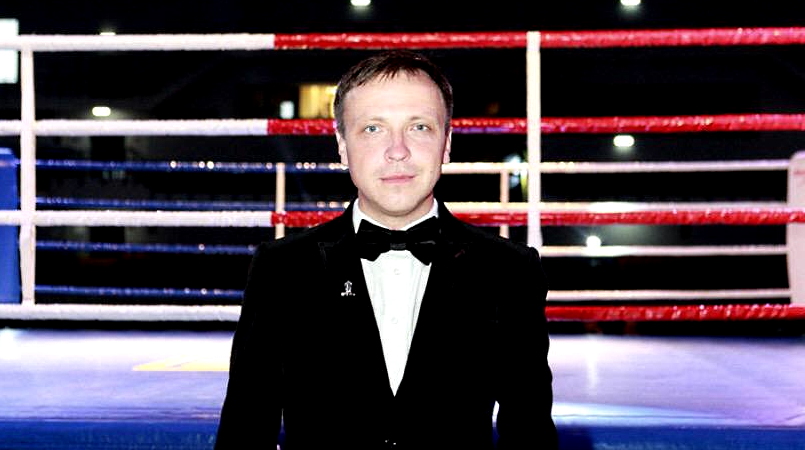
Oleksiy Symonov is a charismatic 44-year-old, host of various events and sports competitions. He says that the most important thing is communication — it often helped him not only to survive the attacks on Mariupol, but to also successfully take all of his shelter’s companions out of there.
Tell me, please, about the first day of the war in Mariupol. What was it like for you?
The day was hectic. My wife panicked when the shelling started and wanted us to leave. We didn’t believe that the war would happen. How can one imagine in the 21st century that someone would shell residential areas? It was impossible to imagine. It seemed that they would shoot somewhere and then it would sort itself out — they would leave and start negotiations. Such was the first day — we did not believe the things happening around us.
And when did you realise that it wouldn't simply end and you would have to leave?
I realised that around February 26-27 or so. But I couldn’t leave anymore. I didn’t have a car, and even if I had one — I don’t know whether I would have risked going knowing that there was already a convoy of occupiers on the route. Probably not. I’m afraid that those who left on February 27th or 28th risked a lot.
What part of the city did you live in and what happened there?
Kalmius district, around Neptune, the residents of Mariupol know it well. It is near the Illich [iron and steel] plant. During the first days it was relatively calm compared to what came next. Later, in March, it hit right next to us. And before that we heard shooting that occurred somewhere in Sartana, around March 23rd.
It was loud, it was scary, but now I can analyse it and say: “Eh, it was nothing.” When it happened really close to us, we realised how bad it really was.
Tell me about life in Mariupol during the war.
Well, at first it was just scary because they were shooting — we fled to an improvised shelter because the city authorities hadn’t prepared any shelters. Then the electricity disappeared, the water, the gas. It helped a lot that for many years we had watched various disaster movies. Also that I did well in school where we were taught how to survive, the pre-draft training and all that.
We gathered firewood and water, melted the snow, gathered rainwater, and gathered food. It was very important to be communicative, because communication is much more important than money — that didn’t matter anymore. There were more than 280 people in the shelter. We helped one another, that’s why we survived. Other people are there now, trying to survive in the same way. They save droplet by droplet, and 140-150,000 more survive in the same way now.
Did you interact with the military in any way?
We had a military hospital in our district. For the first week I visited it in my free time and we helped to protect the windows from shrapnel. We barred them with sandbags so that doctors could work, because they were not only saving the military — they also helped the civilians who suffered because of the shelling. I witnessed the first missile or bomb fall on Kirov street when they brought the injured. There was a time when we filled the sandbags and attached them to the windows — and then an old man came to the hospital and said: “Guys, something’s hit my hip.” The doctors looked and found shrapnel in his hip. Later, around two weeks ago, I saw a video where Russian journalists were standing near that window that I had covered with bags in the hospital saying that the Azov headquarters were there: “We chased the fighters out of the hospital, they were shooting from here.” I thought to myself, “Wow! It turns out, if I didn’t leave, I would have seen the soldiers!” The thing is, our soldiers didn’t shoot back, they were saving people. I know that before it was “liberated” on [March] 15th or 18th, the entire hospital was quickly evacuated. As far as I know, they might have gone to the shelter at the plant, because now I see the same doctors and soldiers with whom I spoke back in March, on the list of people wanted [by Russia]. My heart grows heavy because of that — these are the people who helped and now they are wanted. They saved a lot of others, but will somebody save them?
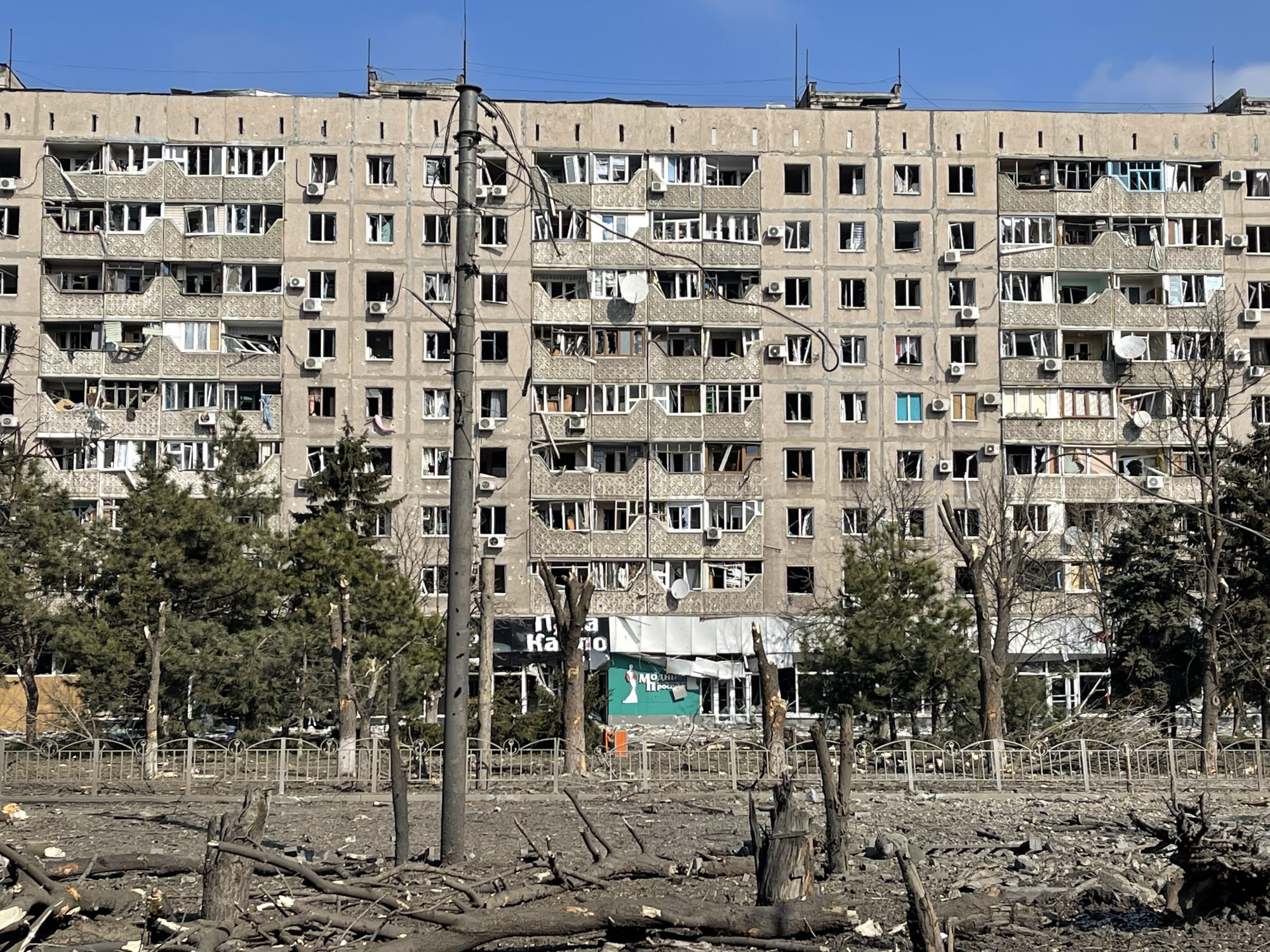
I turned to our Kalmius Regional Department of Internal Affairs — to the police. We helped search for people the best we could. At that time, they were mostly taking out bodies rather than searching for survivors. The soldiers helped with medications when we desperately needed them. They gave us what they could. When I watch the news, they tell us that we should take Molotov cocktails and throw it at the tanks, but we didn’t see vehicles belonging to either Russia or ‘Donetsk People’s Republic’. We were simply pummelled by artillery, air strikes and mortars. We saw soldiers only when we were leaving the city. Our district was simply tortured, destroyed by artillery. We had five craterscaused by air bombs near our shelter. Why five and not six? Because the sixth bomb hit a transformer box. The box fell and so there was no crater but a 4-metre transformer box was simply levelled. That happened around March 13rd or 16th, because back then the exact date didn’t matter anymore. The main task was survival. You survived today – good, you need to survive tomorrow. We planned how to feed the children with hot food, we needed to get water, also check that no [identifying] marks would appear on the shelter and that looters wouldn't steal gasoline from cars. Between about March 13rd and 16th it [the war] was very hot — we were pummelled for three days, our shelter specifically, probably because it could be seen by geolocation. People charged their phones and then they began to hit us.
Do you know what happened to your house and the neighbouring buildings?
It is very difficult to talk about the buildings, I cannot say anything, because nobody has connections with the city anymore. As Kuleba said: “That’s it, Mariupol is gone, it is levelled.” However, there are still more than 100,000 people there, you understand? As long as they live, Mariupol is not destroyed and we need to save people there. It is not important whether the buildings are intact, it is important that the people are still there. The living who cannot leave, who are not allowed to leave, who are misinformed. It is currently very hard.
Regarding the fact that they don’t allow people to leave, what prevented your escape from Mariupol?
The lack of information, lack of safe corridors, also the lack of transportation. I have three children and I thought I could not put my children in such danger. We waited until it got a bit warmer, so that if we went, we would not freeze after the sun sets . We also waited for the shelling to shift away from our shelter at least a bit, to make sure we at least would not be hit like everything else around us while we were escaping.
“I had acquaintances who were approached by a bus and the driver told them: ‘We are going to Zaporizhzhia.’ They got in and arrived near Donetsk.”
There are a lot of reports that the Russians take people en masse to Russia or the temporarily occupied territories of Ukraine. Were you offered to leave? Do you know anyone who agreed to leave like that?
Yes, we were offered. They suggested it in such a nice way, wow: “Go to Rostov, to Donetsk, there’s a bus,” — it happened in Nikolske and Manhush, — “You are expected there. There will be warm food and a place to live, there will be work, everything will be fine.” We called them ‘Cheerful political instructors’. They were well-prepared psychologists. When we were in Nikolske, we couldn’t get away from those “liberators”: “We will help you, there is food.” I wanted to tell them that we had food, had a house, we didn’t have to go anywhere, we only travelled when we wanted to. However, in Manhush I realised that they are understaffed. They tried to enlist people and quickly train them and send them to ‘DPR’ or to Russia. One morning a soldier arrived and said: “Well, are you going to stay in this kindergarten for a long time?” We said: “We arrived to spend a night, then to move further to Ukraine, at least get to Zaporizhzhia.” And he says: “Ahh” — it was as if his software malfunctioned. At that moment we understood everything. He wasn’t prepared for such an answer. He was ordered to recruit those who were there two, three, four nights.
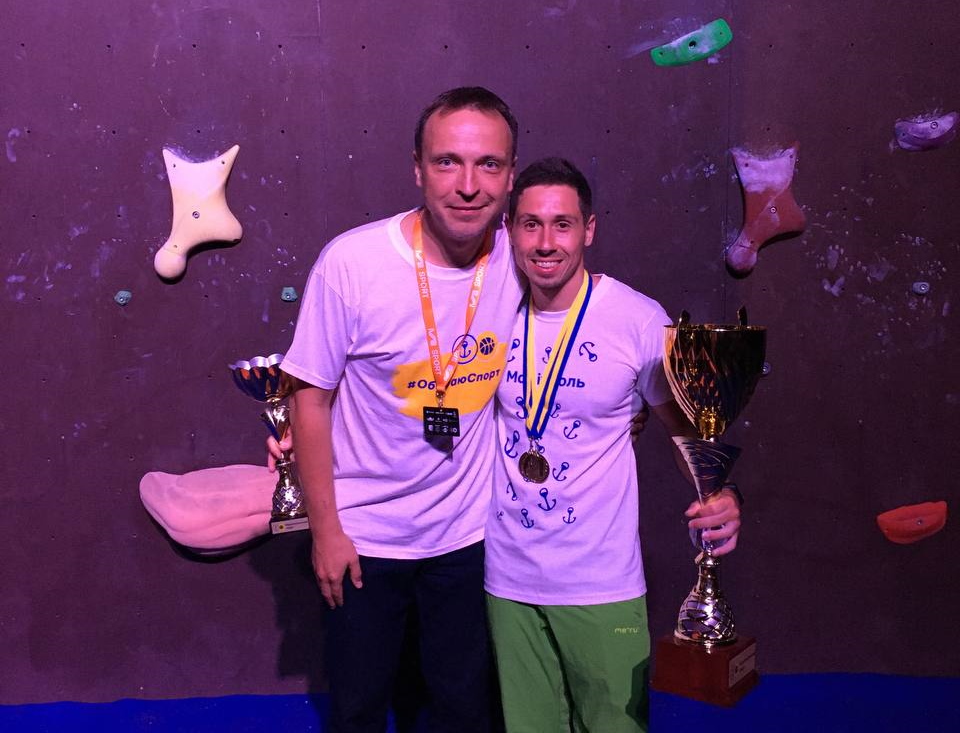
We arrived in Manhush on March 22nd. On that day humanitarian convoy buses were going to Mariupol from Zaporizhzhia, and appearing in the evening: “Who wants to go to Donetsk? There is a chance to go!” I went outside to take a look and I thought:“Buses at night, what the hell.” I looked closely and I saw that it was municipal transport from Zaporizhzhia. I phoned the volunteers from Zaporizhzhia and they said: “Yes, Oleksiy, that was our convoy, but they took all the buses.” I answered: “Your buses went to Donetsk!”
When I went outside, they gave us what one would call a chance: go or stay. But I knew what would come next. I had acquaintances who were approached by a bus and the driver told them: “We are going to Zaporizhzhia.” They got on the bus and arrived near Donetsk.
You are so positive and your Telegram channel says that you are the host of mass events. Tell me please about your life before the start of the invasion and what do you plan to do now?
Before the start of the invasion I had a very nice life. I had many plans for this year as well. I am not only a host of events, I am also an announcer at sports competitions — all-Ukrainian and international. In Mariupol I hosted hockey games as an announcer. Ukrainian climbing championships, rowing, boxing and basketball were already . I am also an international speaker and a game master. I teach hosts and child entertainers to host various events. In addition to the events, I worked with children, I worked and still work with the “Yellow and blue wings” fund, it is a Ukrainian-based international fund. Now we are helping many refugees. This help [to displaced persons] and cooperation with “Yellow and blue wings” are in my plans. As for my main activity which I've been doing for over 30 years, I talked to hosts in Chernivtsi who waited many years for me to come to them. Now I’ve arrived and we plan to write several ‘movers’ — songs for little children, for kids with disabilities.We’re now engaged in this creative process. We also write material for animators who still have a place to work. With our friends who work as volunteers we still help one another and we keep in touch. The communication is important because it saves people. You all see how Ukrainians help each other. I am in Uzhhorod now. People who I never knew gave [me] shelter. They are acquaintances of my acquaintances. And it is great that such fine people exist.
You have already talked a bit about leaving the city. Tell me how it happened.
On March 20th we looked and saw that it had calmed down a bit. It also became a bit warmer. On March 21st a boy from our shelter went to recon one part of the district, I went to another one. We saw that they were shelling a bit farther from us. We gathered everybody from our shelter who wanted to go. I announced that we would leave the next morning at 8 am. Everyone who wants to go should prepare, we will only take what is necessary. Everybody took their belongings and we went quickly, our task was to reach at least Nikolske or Manhush. This is because we expected the buses to go from there, because one person from the government — the name starts with ‘V’ and ends with ‘ereshchuk’ [Oleksiy means the name of Iryna Vereshchuk, Minister of Reintegration of Temporarily Occupied Territories] — announced that beginning March 15th the rescue buses will go from Manhush to Berdiansk every day. When we arrived to Manhush, I asked the locals about the buses. They said, “Liosha [short name for Oleksiy], since February 24th there wasn’t a single official bus from Manhush to Berdiansk.”
We walked 15 kilometres from Manhush to Komyshuvate and we made it 10 minutes before the store closed. A small village shop. We rushed to buy water, because we didn’t expect that we would have to walk for so long. We also needed to buy bread. I found the head of the village. He said “I don’t have anything, but you can use our club as a shelter, although it is not heated.” To that we said: “the main thing is we are not in the open air.” Then a lady who worked at that shop came out and asked us where we had come from. We said:“From Mariupol.” She responded: “To hell with the club. I can take 12 people and Lyuda can take five more.” Well, the families gave us shelter in Komyshuvate in warm houses. We showered for the first time in a month. What can I say? I have a second family in Komyshuvate now. In the morning they helped us to move further, and gave us all a ride. They took us to Demyanivka and on March 24th we were taken from Demyanivka. From there through bumps and some guerrilla tracks we were brought to Zaporizhzhia. There were 17 or 18 checkpoints of Russians and ‘DPRers’ and finally we reached Ukraine. We arrived in Zaporizhzhia and were placed in a kindergarten and in the morning we boarded a train. In fact, our group was taken to a separate train car and placed there.
“Across the 15 checkpoints we have seen all of Russia: there were Udmurts, Kazakhs and Chechens. The entire spectrum, starting from Sakhalin.”
There were 117 of us, 70 made it to Ukraine. Some people went to Rostov, to Russia, because they had relatives or friends there. Well, everyone has the right to choose. That’s what makes Ukraine different from those who came from Russia. We have a choice. We decide what to do and how to do it. And in all circumstances we remain human.
What is it like, when 117 people take such a journey? Of course, I’ve made trips to the mountains, but those were groups of 20 people at best. When 117 people travel such a distance together…
Look, you march vigorously with a backpack surrounded by people who are also walking with backpacks, bags, boxes, with cats; with little children who also carry backpacks and bags. Well, it’s such a big procession. When my friends realised that I’m alive, they wrote: “You are not Symonov, you are Symoses. Bringing people through asphalt desserts.” When you march and it is quiet all around — that's how we went from Manhush — everything is fine. But when you leave the city under shelling — it is very scary. When you say that they are shooting far away and we can go slower, everybody says: “No-no-no!” Both old and young ones say the same. We had both 70-year old people and 5-year old kids [wanting to leave as quickly as possible].
How did the military react to the movement of such a convoy, what did they say at the checkpoints?
Look, in March they still had to look like angels wearing white robes, they were our ‘liberators’. We were liberated from our homes, from our life. To avoid provocations they were nodding to us — “pass, pass, you need to go there.” I know that later there was a lot of aggression, but when we were passing, they wanted to look like good guys. “We will help with this and that.” We nodded: “uh-huh, yeah.” We did not have time for talking, and why would we talk to them? What could they say that we didn’t know? Nothing. What can they do? They already did what they could. They would have left us without roots, without life. We are starting from scratch now and it is hard.
When we passed the checkpoints, we could see which were the Russian ones and which ones belonged to “DPRers.” At the first 15 checkpoints that belonged to Russians, we saw all ofRussia. There were Udmurts, Kazakhs, Chechens. In general, the entire spectrum, from Sakhalin, probably, from Yakutiya, also Smolensk region [Oleksiy pronounces it mocking a Russian accent]. Yakut was a kind of witty. But all of them performed their duties, which they were ordered to do. Searching men, looking for tattoos, any information in mobile phones, checking that there are no calluses on the fingers from shooting. But at least it was clear that there were soldiers who pledged at least some kind of oath to their country. For the last 2 or 3 checkpoints there were DPRers, and it was bullsh**, I am sorry. Outsiders with weapons and with rage in their eyes. At one of the checkpoints I was almost shot by one of them, only because I had a callus from the rolling pin. “This is because of shooting!”, he said and I am telling him: “I was cutting firewood.” Then he shot an assault rifle over my head! I am thankful to the guys who got me out of there. When we could, we tried to give them cigarettes or something else to distract them. You have to behave like this — eyes down, yes-yes, no-no, nothing else. Otherwise there was fury and aggression; it was very dangerous for you and for those that travelled with you.
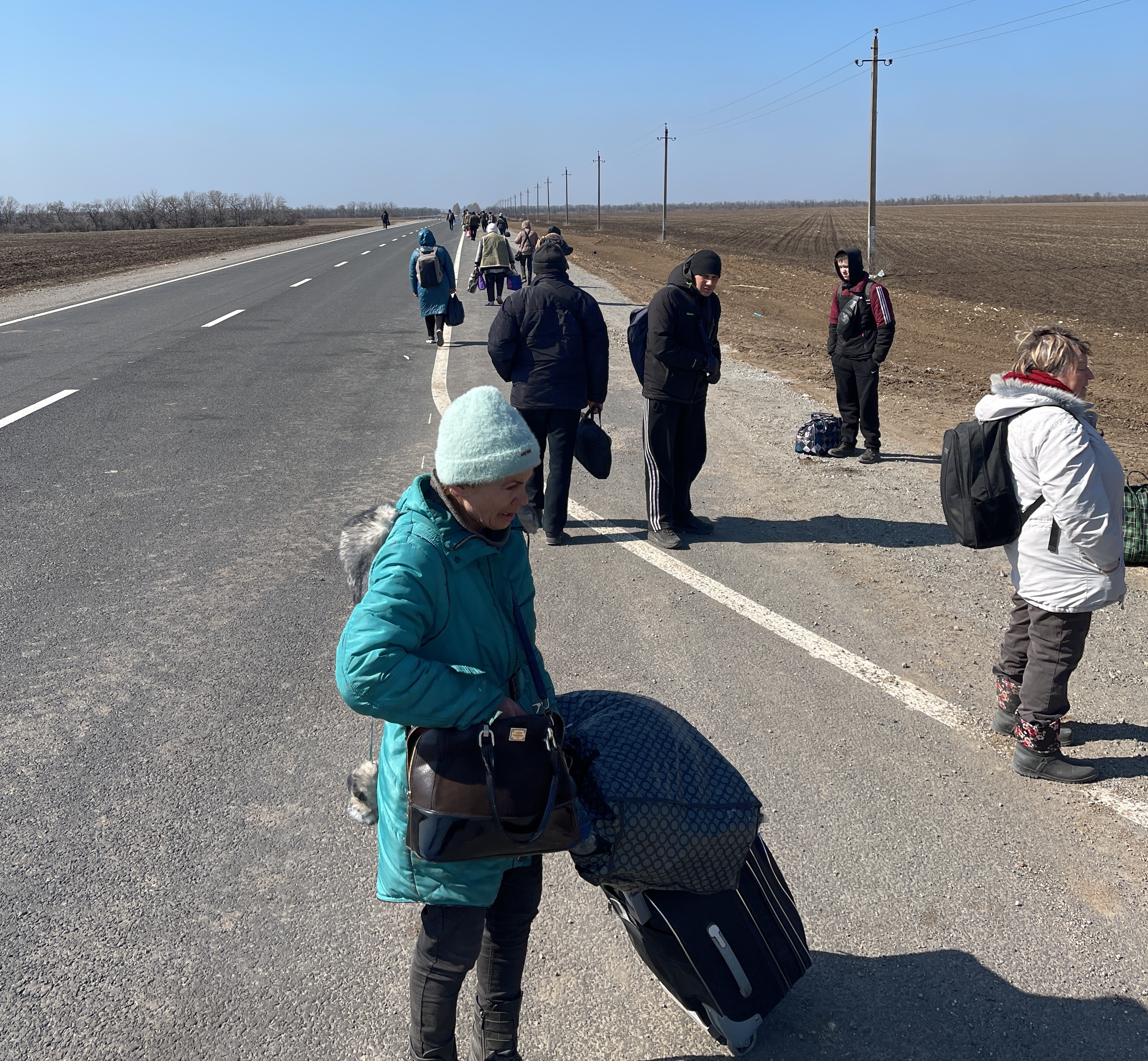
So you should listen to your guides — they are the people who get you out! And if they say “Don’t say anything,” that means you shouldn’t say anything! Because people who get you out, they risk a lot. And there are many volunteers who were taken prisoner and released after a week or two. They weren’t punished for what they did, but rather because some of those whom they were evacuating either got aggressive or too witty. Soldiers are different, you know. There were soldiers who weren’t given instructions and instead of Mariupol they arrived in the first days to Melitopol with their vehicles. This gave our guys a few days to regroup and provide at least some defence to the city. When I saw that on [February] 27th or 28th Russian vehicles entered Melitopol, — I thought “What? Why would they need Melitopol?” And then my friends from Melitopol wrote: “The vehicles entered, passed and left.” I said: “Ah, so they are like Gazmanov, mistake Melitopol for Mariupol.” Because in the 2000s, when the acrobat [Gazmanov] was still visiting, he arrived to us for the Day of the City, went on stage and said “Hello Melitopol!”
You are talking about attitudes on the checkpoints, but have you witnessed civilians being killed at checkpoints, or taken somewhere, tortured?
Yes, people were taken! When our group travelled, one person was taken — they found conversations with soldiers in his phone, and he was taken. I don’t know the subsequent fate of that person.
Do you know people who were killed in Mariupol? Who died because of shelling, or sniper fire, or a direct attack of the military?
Of course. Every day I receive news, every day I read, holding my breath, finding the names of my acquaintances. It is very hard when you lose people. I was lucky — my relatives are alive. The father of the people who were with us, died in the yard of his house. A shell fell and that’s it. The man crossed half of the city to visit his daughters before that. They said: “Stay in our shelter!” And he said: “No, I have my house, I need to be there.” It is all very hard.
Was it possible to do anything to prevent that situation in Mariupol at least in part?
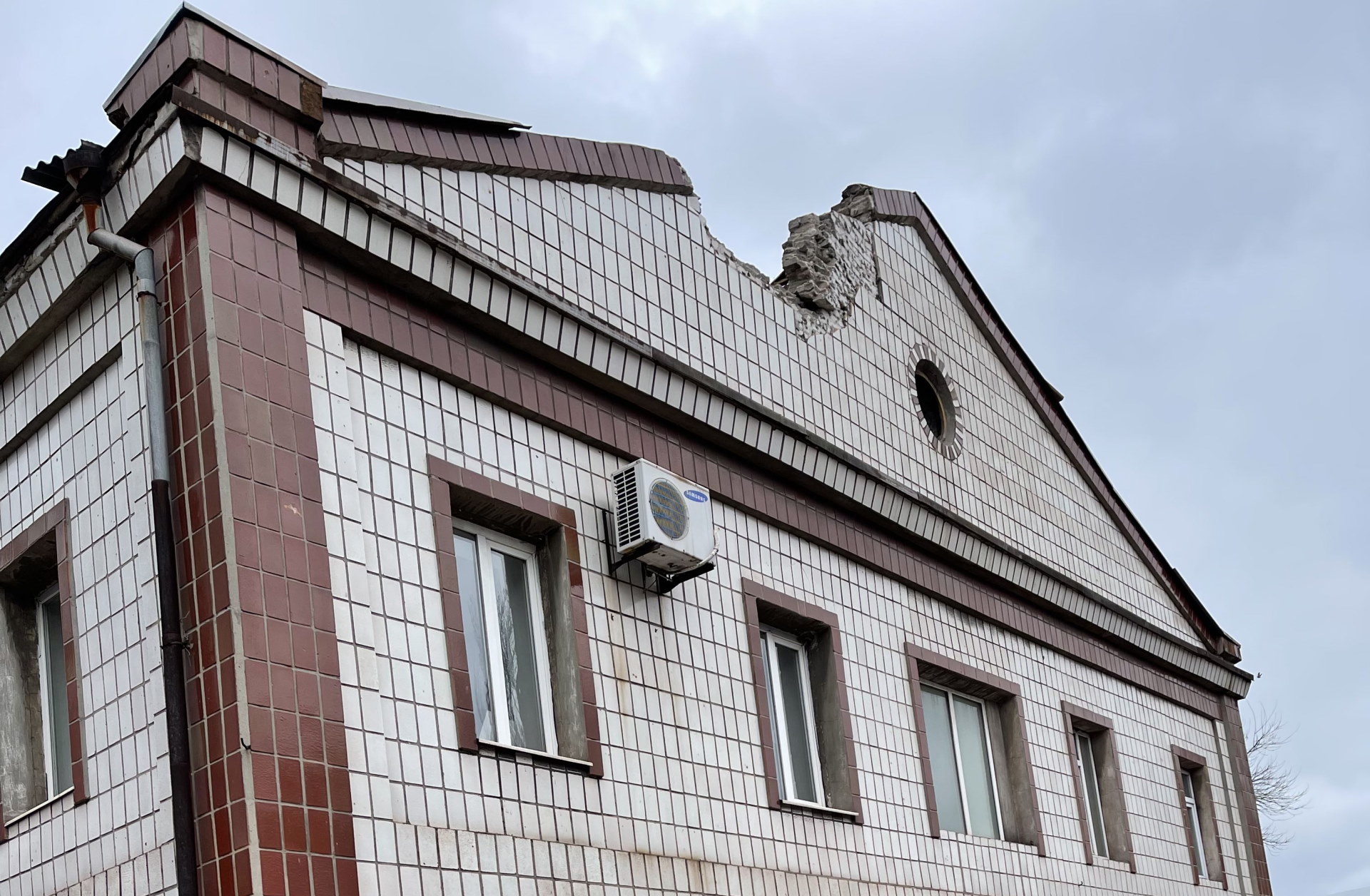
Of course! Naturally.
What exactly?
At least don't say that “we will do everything and nobody will attack us,” but instead prepare! Instead of inflating their own significance and advertising themselves, they could have simply prepared. Like the plants prepared, for example. The plants prepared for the hot preservation, prepared shelters on their site, because the plant leaders understood that the war may be avoided but they should prepare. They prepared food rations in the shelters, some water. People still use the supplies they made. And imagine if it was an unprepared shelter… Imagine on the day when it all begins and people arrive, instead of the shelter there is a closed and flooded basement. And nobody knows who has the key. They said “Shelters are everywhere, come.” You know, our Mariupolers are easy to recognise in other cities — when a siren sounds they don’t react. You know why? Because we didn’t have sirens.
What do you feel now towards Russians?
Nothing. Absolutely nothing. Understand this: Russians and soldiers are different people. Russians and their government are different people. You cannot spit hatred, this won’t give you anything useful. There are brainwashed people who shout ”Kill them all.” It is difficult to call them Russians, it is difficult to even call them human. People who urge to kill children cannot be called human. Regardless of where they live, in Russia or in Bangladesh. Or in Somalia, yes? As for Russians — they don’t have a choice. Many of them don’t have critical thinking skills. Many of them still lack understanding of what is going on. That’s why those who bring war and take up arms — they must be destroyed. This is clear. People who live in their small world — well, people are people everywhere. I don’t have any attitude towards Russians. Pity. They are just a foiled generation. I would want to erase that country from the map. Although there are also fine people there who try to say something — some are scared, some aren’t. But there are too few of them. It is much easier just to turn the tube on and listen to what is coming from it.
Translation by Vitaliy Konkin and Tanya Karliychuk.





